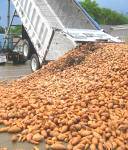Vision
The Society of St. Andrew envisions a world in which physical and spiritual hungers are met through God’s grace and abundance in Jesus Christ.
Mission
The Society of St. Andrew brings people together to harvest and share healthy food, reduce food waste, and build caring communities by offering nourishment to hungry neighbors.
Welcome
 The Society of St. Andrew welcomes people of all faith traditions, as well as those whose desire to help others springs from simple altruism or from a commitment to use earth’s resources wisely in service to brothers and sisters in need.
The Society of St. Andrew welcomes people of all faith traditions, as well as those whose desire to help others springs from simple altruism or from a commitment to use earth’s resources wisely in service to brothers and sisters in need.
Wherever we come from, and whatever our motivation, we offer ourselves in service, to use earth’s bounty to feed hungry people.
Mandate
 With roots deep in the Judeo-Christian faith, SoSA’s mission is supported and guided by the scriptures of the Old and New Testaments:
With roots deep in the Judeo-Christian faith, SoSA’s mission is supported and guided by the scriptures of the Old and New Testaments:
Leviticus 23:22
When you reap the harvest of your land, do not reap to the very edges of your field or gather the gleanings of your harvest. Leave them for the poor and for the foreigner residing among you.
Deuteronomy 24:19
If you are harvesting in your field and forget a sheaf there, do not go back to get it. It is to be left for the foreigner, the fatherless, and the widow, so that the LORD your God may bless you in all the work of your hands.
Matthew 25:35
I was hungry and you gave me something to eat.
Acts 2:42-47a
They devoted themselves to the apostles’ teaching and to fellowship, to the breaking of bread and to prayer. Everyone was filled with awe at the many wonders and signs performed by the apostles. All the believers were together and had everything in common. They sold property and possessions to give to anyone who had need. Every day they continued to meet together in the temple courts. They broke bread in their homes and ate together with glad and sincere hearts, praising God and enjoying the favor of all the people.
1 John 3:18
Let us love not only in words, but in deed and in truth.
Name
 The Society of St. Andrew founders lived in a covenant (faith-based contractual) relationship, where they held all things in common, followed the directives of scripture, and sought to live faithfully and simply in community, basing their lives together on the early Christian community described in Acts 2:2-47. They called their covenant community a “society,” and we honor the humility and vision of our founders today (39 years later) by continuing to use “society” in referring to the organization.
The Society of St. Andrew founders lived in a covenant (faith-based contractual) relationship, where they held all things in common, followed the directives of scripture, and sought to live faithfully and simply in community, basing their lives together on the early Christian community described in Acts 2:2-47. They called their covenant community a “society,” and we honor the humility and vision of our founders today (39 years later) by continuing to use “society” in referring to the organization.
In the Gospel of John (John 6:1-14), Jesus has been teaching for hours, far from the city, and it is long past mealtime. The disciples want to pack it in and send everyone home for supper. But Jesus tells his followers not to dismiss the crowds, demanding instead: “You give them something to eat.”
As John’s gospel recounts the event, Andrew is the disciple who brings a boy to Jesus with some small fish and a few loaves of bread. Jesus blesses the food and shares it with the gathered crowd. This little bit of food, that seems only enough for a child’s lunch, with God’s help becomes an abundance that feeds thousands.
“St. Andrew” comes from the disciple Andrew. As “The Society of St. Andrew,” we are people who find abundance where others see scarcity, and we use that abundance to feed all who are hungry.
Core Values
 The Society of St. Andrew organizes its work around four core values:
The Society of St. Andrew organizes its work around four core values:
Faith
We are called to love God and love our neighbors as ourselves. This is reflected in all that we do. We demonstrate the power and effectiveness of a true Christian community in addressing critical human problems, particularly hunger.
Compassion
We believe in living a just lifestyle and in sharing our resources and the world’s with those whose basic needs are not being met.
Stewardship
We seek to make the most and best use of all resources, in a way that demonstrates competence, justice, and sharing.
Service
We are called to love, not just in words, but in deeds and in truth. This serves as the foundation for all that we do. We provide opportunities for others to serve, fostering renewal in people’s lives, in congregations, and in the communities in which we serve.

